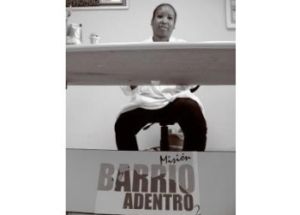
Publisher:
Bonnie King
CONTACT:
Newsroom@Salem-news.com
Advertising:
Adsales@Salem-news.com

~Truth~
~Justice~
~Peace~
TJP
Feb-10-2011 14:41

 TweetFollow @OregonNews
TweetFollow @OregonNews
Ode to Cuban Doctors
Belén Fernandez Salem-News.comA third of Cuba’s 75,000 doctors, along with 10,000 other health workers, are currently working in 77 poor countries.
 Cuban medic in Venezuela (Photo: Amelia Opalinska) |
(ISTANBUL) - A December article in the British daily The Independent, entitled “Cuban medics in Haiti put the world to shame”, begins by noting that, despite Barack Obama’s pledge for a monumental humanitarian mission to Haiti following the 2010 earthquake, U.S. efforts have paled in comparison to those of Cuba, which has had a sizable medical contingent stationed on the Caribbean island since 1998.
Cuban doctors and nurses have been instrumental in responding to the Haitian cholera outbreak, though their efforts have gone largely unrecognized internationally.
The article, by Nina Lakhani, contains a wealth of details that might be of interest to persons concerned that socialized medicine produces inferior results.
After noting that “[a] third of Cuba’s 75,000 doctors, along with 10,000 other health workers, are currently working in 77 poor countries”.
But that “this still leaves one doctor for every 220 people at home, one of the highest ratios in the world, compared with one for every 370 in England”, Lakhani writes:
Medical training in Cuba lasts six years – a year longer than in the UK – after which every graduate works as a family doctor for three years minimum. Working alongside a nurse, the family doctor looks after 150 to 200 families in the community in which they live.This model has helped Cuba to achieve some of the world’s most enviable health improvements, despite spending only $400 (£260) per person [in 2009] compared with $3,000 (£1,950) in the UK and $7,500 (£4,900) in the US, according to Organisation for Economic Co-operation and Development figures.
Infant mortality rates, one of the most reliable measures of a nation’s healthcare, are 4.8 per 1,000 live births – comparable with Britain and lower than the US. Only 5 per cent of babies are born with a low birth weight, a crucial factor in long-term health, and maternal mortality is the lowest in Latin America, World Health Organisation figures show. Cuba’s polyclinics, open 24 hours a day for emergencies and specialist care, are a step up from the family doctors. Each provides for 15,000 to 35,000 patients via a group of full-time consultants as well as visiting doctors, ensuring that most medical care is provided in the community”.
I have written before about my fondness for Cuban doctors deployed internationally and my patronage in recent years of Cuban clinics in Venezuela, where medical personnel attended to my real and imagined health care needs and graciously obliged when my traveling partner Amelia and I wanted to hook a visiting Lebanese-Palestinian friend up to a variety of machines.
The irony was not lost on the Cubans, of course, that I, a citizen of the country presiding over the embargo that prevents Cuban acquisition of various medicines and equipment, had ended up a recipient of their free services. However, they made it clear that discrimination in health matters would not be applied to any human being, not even to the Venezuelan elite engaged in a continuous bout of anti-Cuban hysteria.
In all, a far more ethically satisfying outlook than that espoused by countries whose medical experiments include devising ways to make Fidel Castro’s beard fall out.
 |
 Belén is co-editor at Pulse Media. Her articles also have appeared in CounterPunch, Narco News, Palestine Chronicle, Palestine Think Tank, Rebelión, Tlaxcala, The Electronic Intifada, Upside Down World, and Venezuelanalysis.com. Her book “Coffee with Hezbollah,” a humorous political travelogue chronicling her hitchhiking trip through Lebanon in the aftermath of the 2006 Israeli assault, is available at Amazon, Amazon UK, and Barnes and Noble.
Belén is co-editor at Pulse Media. Her articles also have appeared in CounterPunch, Narco News, Palestine Chronicle, Palestine Think Tank, Rebelión, Tlaxcala, The Electronic Intifada, Upside Down World, and Venezuelanalysis.com. Her book “Coffee with Hezbollah,” a humorous political travelogue chronicling her hitchhiking trip through Lebanon in the aftermath of the 2006 Israeli assault, is available at Amazon, Amazon UK, and Barnes and Noble.
Born in Washington, DC, in 1982, Belén earned her bachelor's degree with a concentration in political science from Columbia University in New York City. Her diverse background of worldwide experiences, created a fantastic writer; one whose work we are extremely happy to share with Salem-News.com viewers. You can contact Belén at: belengarciabernal@gmail.com
Articles for February 9, 2011 | Articles for February 10, 2011 | Articles for February 11, 2011

Quick Links
DINING
Willamette UniversityGoudy Commons Cafe
Dine on the Queen
Willamette Queen Sternwheeler
MUST SEE SALEM
Oregon Capitol ToursCapitol History Gateway
Willamette River Ride
Willamette Queen Sternwheeler
Historic Home Tours:
Deepwood Museum
The Bush House
Gaiety Hollow Garden
AUCTIONS - APPRAISALS
Auction Masters & AppraisalsCONSTRUCTION SERVICES
Roofing and ContractingSheridan, Ore.
ONLINE SHOPPING
Special Occasion DressesAdvertise with Salem-News
Contact:AdSales@Salem-News.com


Salem-News.com:

Terms of Service | Privacy Policy
All comments and messages are approved by people and self promotional links or unacceptable comments are denied.
[Return to Top]
©2025 Salem-News.com. All opinions expressed in this article are those of the author and do not necessarily reflect those of Salem-News.com.